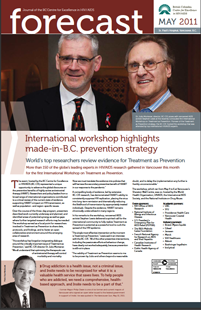International workshop highlights made-in-B.C. prevention strategy
World’s top researchers review evidence for Treatment as Prevention
More than 150 of the globe’s leading experts in HIV/AIDS research gathered in Vancouver this month for the first International Workshop on Treatment as Prevention.
The event, hosted by the BC Centre for Excellence in HIV/AIDS (BC-CfE) represented a unique opportunity to advance the global discourse on the preventive benefits of highly active antiretroviral therapy (HAART). Researchers and policy leaders from a broad range of international organizations contributed to a critical review of the current state of evidence supporting HAART’s impact on HIV transmission, as well as population- and region-specific issues.
Over the course of the three-day program, presenters described work currently underway and planned, and identified areas of potential synergy as well as gaps where further targeted research efforts may be needed. The workshop served as a focal point for researchers involved in Treatment as Prevention to share data, protocols, and findings, and to foster an open collaborative environment around this emerging area of research.
“This workshop has forged an invigorating dialogue around the critically important issue of Treatment as Prevention,” said BC-CfE director Dr. Julio Montaner. “We all understand that optimizing the therapeutic use of antiretroviral therapy will control morbidity and mortality. Now we must translate the evidence into policies that will harness the secondary preventive benefit of HAART in our response to the pandemic.”
A compelling body of evidence, led by extensive BC-CfE research, has demonstrated HAART’s ability to consistently suppress HIV replication, placing the virus into long-term remission and dramatically reducing the likelihood of transmission by appropriately treated individuals. Despite the evidence, HAART remains chronically underutilized in many regions.
In his remarks to the workshop, renowned AIDS activist Stephen Lewis delivered a spirited call for the international community to fully realize Treatment as Prevention’s potential as a powerful tool to curb the spread of the HIV epidemic.
“The single most effective intervention at the moment is Treatment as Prevention,” Lewis said in an interview with the BC-CfE. “All of the other preventive interventions, including the passionate efforts at behaviour change, have clearly not worked adequately, because prevention is still not in place.
“The validity of Treatment as Prevention seems to me to be proven by Julio and others beyond a reasonable doubt, and to delay the implementation any further is frankly unconscionable.”
The workshop, which ran from May 4 to 6 at Vancouver’s Sheraton Wall Centre, was co-hosted by the World Health Organization, UNAIDS, the International AIDS Society, and the National Institute on Drug Abuse.

